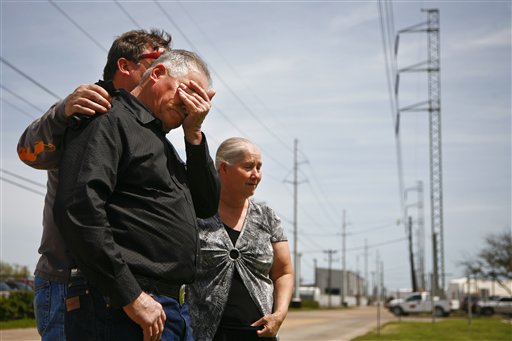
TEXAS CITY, Texas (PAI) – On the eve of the 10th anniversary of the fatal explosion and fire at BP’s Texas City, Texas refinery, the former judge who heard the 4,016 cases in its aftermath is now speaking out for the strikers at that same refinery.
In an op-ed published in the Galveston County Daily News and posted on the United Steelworkers’ website, former Texas District Judge Susan Criss described the hearings and the pain of the families who came to court to try to get relief for their suffering. After 15 years on the court, Criss is now an attorney in private practice.
The Texas City plant utterly exploded on March 23, 2005. The disaster killed 15 workers and injured another 180 people, inside and outside the plant.
Subsequent federal and corporate investigations revealed BP had a culture that dismissed worker safety complaints, ignored the Steelworkers’ documentation of the plant’s problems, and put profits over people. They also showed the plant, now owned by Marathon, had not had a top-to-bottom Occupational Safety and Health Administration (OSHA) inspection ever. Nor had other refineries in the Houston-Galveston corridor.
Those rampant safety problems led BP to clean up its act, as long as OSHA still rode herd and levied millions of dollars in fines. Marathon, however, refuses to continue the measures, the workers told PAI last year.
The BP blast was the first of a long series of rampant oil industry safety problems – problems so bad that the nation’s refineries average a reported accident every eight days, and have for a decade. USW made safety its number one topic for bargaining in this year’s contract talks.
But industry-wide refusal to address the issue forced the USW to start its strike at midnight Jan. 31, and led Criss to write her op-ed.
“Why would a company refuse to guarantee workers the right to a safe workplace? Because the lives and safety of their workers do not matter enough to cut into profits. Because the people that do the work generating those profits do not matter,” she wrote.
“Why are the union members not backing down? Overtime dollars pay a lot of bills and then some. Striking means bills go unpaid. Why not take the money and take their chances?
“Because they cannot forget the cost of working in dangerous conditions.
“I know because I presided as trial judge over all 4,016 legal claims arising from that explosion. I had to meet the families of those killed who had surviving children and some of those burned and one who had been comatose. I remember one man’s skin was burned so badly that you could not discern his original skin color or race. I saw court staff fight back tears listening to the stories of the survivors and the surviving family members.
“Why are the USW members on strike? Because their workers do matter.”
Meanwhile, in the latest developments, the refinery workers rallied on March 6 outside Shell’s Houston headquarters, and then boarded buses to a follow-up demonstration outside the Marathon (BP) Texas City refinery.
Shell is the designated oil company that USW is trying to bargain with over a “pattern contract” that would then be applied to the rest of the “Seven Sisters,” the nation’s oil firms.
The union represents some two-thirds of the nation’s oil refinery workers, but not all have been called out on strike. Instead, USW is striking some 12-15 of the refineries, in Texas, California, Washington, Indiana and Ohio, among others.
“This Safe Refineries Save Lives Day of Action signifies the need for the oil industry to bargain fairly and address USW members’ concerns over the safety of their facilities, excessive overtime leading to fatigue, unsafe staffing levels that prompt excessive overtime, and the use of inexperienced contractors with insufficient safety training for daily maintenance and repair work,” USW explained.
But when the striking workers, at their Houston rally, tried to enter the headquarters to serve a petition on Shell’s top management, Shell called the police, who politely evicted them. There were no arrests.
“We wanted to see if they would talk to us about the negotiations,” said Steelworkers Local 13-1 President Lee Medley told Reuters news service.
The two sides are also trading unfair labor practices – labor law-breaking – charges before the regional office of the National Labor Relations Board. The union has formally called the refinery strike an unfair labor practices strike, not an economic strike. If the NLRB agrees, the oil firms legally cannot permanently fire the workers and must take them back when a settlement is reached.
One big Houston area oil firm customer retaliated by charging the union with illegal intimidation of non-strikers. That firm is getting legal aid from the notorious anti-worker National Right To Work Committee and its foundation.
Photo: Rafael Herrera, second from left, and his wife Magdalena remember their son, Rafael Jr., who was killed in the BP refinery explosion in Texas City, while being comforted by Paul Platz, a worker who was at the refinery the day of the catastrophe, during a memorial and moment of silence at the site, March 23, 2010, in Texas City, Texas. | Michael Paulsen/AP & Houston Chronicle












Comments